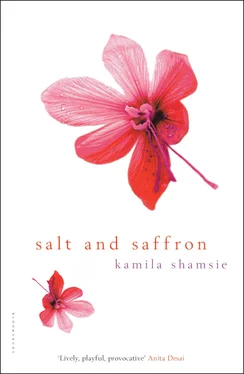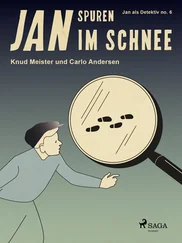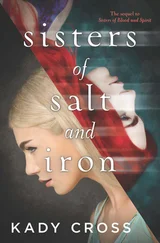‘So why don’t you have the ring? Akbar was the oldest of the triplets.’
‘Well, of course, no one really knows that. Taj was the only one who was really sure of the birth order, and she disappeared without passing on the information. I think my mother-in-law just guessed that Akbar was the eldest. So, acknowledging the fact that any of the three boys could be the eldest, their grandfather decided that the ring should go to the bride of whichever brother married first. When Taimur left, he took the ring with him.’
No wonder she used to look at Mariam so strangely sometimes when she thought no one else was watching. She was searching for clues to the identity of that other woman. But Mariam looked so much like Taimur you’d almost believe she was Athena to his Zeus, springing fully formed from his forehead with no one around to whom she could attach the title of ‘mother’.
‘So you never loved Akbar?’ I felt a sudden surge of protectiveness towards my grandfather.
‘Of course I loved Akbar. What questions you ask. And you should refer to him as “Dada”.’
I was silent, waiting for more.
‘When Akbar came back from Oxford, and I heard his parents were arriving at my house with a rishtah, I was thrilled. Told my parents to accept the proposal with alacrity, and damn etiquette.’ She lay back, smiling wistfully. I waited for her to continue, but she was in a long-ago world.
‘And all this is related to the monsoons how?’ I demanded.
‘Taimur left during the first of the monsoon rains. All through our married lives, Akbar and I barely spoke to each other when the rains began. Not through anger. We just knew each other’s need to grieve and remember. Yes, Akbar knew I loved Taimur first. Maybe we should have grieved together, but we didn’t.
‘Then Akbar had his stroke, and before the ambulance arrived we heard the crack of thunder and the rain poured down. That, too, was the first of the monsoon showers. His last words were, “Oh, Abida, what a wretched time for me to leave you.” Except his words were slurred and at first I thought he had said, “What a wretched time for me to love you.” I’ve avoided the monsoons since. Because I don’t want to know the hierarchy of my love. When the rains begin I don’t want to know which of those two brothers I’ll weep for first.’
When she said that she did start to weep, for both of them I think; and I wept also, at my own stupidity. For four years I’d thought it was pure snobbery that had made Dadi say, ‘That whore!’ For four years I’d nurtured an image of Dadi based on that notion of her overriding snobbery, and now, with Dadi so old (suddenly she looked so old), I saw that I had lost four years of her life because there had been such snobbery in my reaction to that elopement. I had recoiled with such horror to think that my cousin had run away with the cook, that I hadn’t considered that anyone else could be better than me. I saw now that Dadi’s reaction to Mariam’s elopement was directed not at Mariam, but at her mother — that near-mythical woman who had known what it was to be loved by Taimur. Dadi’s reaction had arisen from love, but I had wanted so desperately to be the self-righteous one that I forgot everything Mariam Apa ever taught me about listening to the silences that bracket every utterance.
‘Dadi, I’m sorry.’ I rested my head against her shoulder, and when we’d both finally stopped crying I brushed tear tracks off both our faces and said, ‘Salt.’
‘What?’
I shook my head. ‘Just thinking of something Masood said.’
‘You might want to think of calling him Masood Bhai. He is family now, after all.’
I laughed aloud at her ability to surprise me, and then I thanked God for giving me the chance to know her again. Again? No, for the first time. ‘We can talk about Mariam Apa. If you want to. Whenever you want to.’
Dadi smiled. ‘Talk? That’s not always necessary, you know.’ She pushed my hair off my face. ‘Let it go, my darling. Some people leave our lives; it happens. People leave. Let it go.’
I wasn’t about to let it go.
‘Aliya!’ Younger Starch greeted me at her front door. ‘What an unexpected somersault of joy you’ve made my heart just do. Full triple lutz in my rib cage, I swear, at the sight of you. And what a lovely jora you’re wearing — such a nice change from all these other young girls today who always want to be in the height of fashion. I say a few inches here and there around your hemline isn’t worth the expense of a whole new wardrobe. Unless you’re like Kishoo, who has to look good all the time because she has a certain image, you know. And why haven’t we seen you at the dholkis? I think the Ali Shah boy is definitely interested.’
‘Oh, well, actually I know it’s time for you to go for your bridge game and I don’t want to hold you up. I was just stopping by to ask if you were free for lunch tomorrow.’ I knew she wasn’t, but the leap from discussing Taimur with Dadi to fending off matchmaking talk from a Starch was one I couldn’t make without falling into the gaping precipice of incivility, so it seemed best to terminate the conversation as quickly as possible.
‘Oh, I would have loved to, but Sunday brunch at the Club is a must. Must, must, must. Oh, now I’m so sad.’
‘Well, another time, then. But, since I’m here, I might as well say hello to Hibiscus-Eating Ayah.’
‘Who?’
‘Bua.’
‘Oh, Bua! Such names you have for people. I swear, sometimes I think you must have some private nickname for me. Of course, go and see her, but if she starts talking too much just say goodbye and walk out or she’ll go on and on and on and will not stop. What am I telling you this for? You know all there is to know about her. Okay, sweetie, must run. ‘Bye.’
She kissed the air around my cheeks and walked out. I heard her screeching for the driver outside as I walked towards her younger children’s bedroom.
Hibiscus-Eating Ayah had been my ayah, about fifteen years ago. She had come to work for us after her husband died, leaving her children to be brought up by her mother. She would go home to see them once a week, and on very rare occasions they’d come to visit her — two wide-eyed girls near my age who I recall playing with in the garden the first time we met. It was winter then. The next time I saw them it was summer and too hot to play outside, so I smiled hello and disappeared into my room. Technically speaking, it was also their mother’s room, inasmuch as there was a little mattress under the bed which she would pull out and sleep on at night, and there was a corner in my closet where she kept her belongings bundled up, but when you’re seven you know better than to pretend technicalities matter. I remember I asked Ami if I could invite them inside, but the more I think about it the more convinced I am that the memory is merely of something I considered doing. Even at that age, I knew about boundaries. No, let’s be honest. They gave the impression of being unwashed, and I didn’t want them to get fingerprints on my new, giant-sized, snow-white stuffed bunny. (And if I had invited them in? How could that have ended any way but badly? Would it have been the first time they really thought about all they couldn’t have?)
Hibiscus-Eating Ayah, known then simply as ‘Bua’, was a great improvement on her predecessor — a wizened woman who convinced me that my family would suffer not a whit if I regularly took a small amount of money from my father’s wallet and gave it to her for her supply of niswaar, that ghastly, green, tobacco-based concoction which she would spit out in my basin without properly swilling out the spatter afterwards. Her endeavours to lead me into a life of guilt-based crime did not lead to her dismissal, but her penchant for niswaar did. She spat in the wrong direction, and though Aba’s suede shoes bore no permanent mark he saw that as no reason to excuse her uncouthness. Truth is, we all disliked her and were just waiting for a reason to sack her.
Читать дальше












